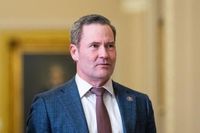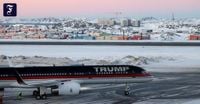In a notable diplomatic event, Usha Vance, the wife of U.S. Vice President J.D. Vance, along with National Security Advisor Mike Waltz, is set to travel to Greenland next week. Their itinerary reportedly includes a visit to Nuuk, the capital of Greenland, and attendance at a traditional dog sled race in Sisimiut, the country’s second-largest city, and a potential stop at the only U.S. air base, located on the northern part of the island. This visit has been characterized as taking place in a private capacity, echoing similar trips previously made by members of the Trump administration.
Details of the impending visit have emerged, although an official confirmation from the U.S. has yet to be provided. According to the Danish media outlet, Jyllands-Posten, Usha and Mike’s trip comes at a politically sensitive time as local elections are set to occur in Greenland on April 1, 2025. The mayor of Sisimiut, Malik Berthelse, has already declined a request to meet the U.S. delegation, citing the ongoing election campaign. “I can confirm that they have approached me and wanted to meet. However, as we are in the middle of the election campaign, I have kindly declined and suggested that we can meet after the election,” Berthelse told local media, ព повз.”
This impending visit has led to criticism within Greenland. Aaja Chemnitz, a Greenlandic member of the Danish Parliament, expressed her concerns via Facebook, commenting on what she perceives as election interference from the Trump camp. “It is clear that the Trump camp does not respect our right to self-determination without outside interference,” she stated. The U.S. delegation's arrival follows a recent protest in Nuuk, where approximately 800 individuals gathered to voice their opposition to U.S. rhetoric regarding Greenland. This protest was catalyzed by President Trump’s past remarks suggesting that annexation of Greenland “will happen” and an assertion that Washington would acquire the island “one way or the other.”
In fact, just last week, President Trump made headlines with his statements promoting the idea of bringing Greenland under U.S. control. This aligns with his previous comments linking Greenland’s resources to national security concerns and the geopolitical significance of the Arctic region. Many Greenlanders view these remarks with apprehension, feeling that Trump’s administrations have failed to respect their sovereignty.
Additionally, there has been a shift in Greenland’s political landscape. Following national elections held earlier this month, the pro-independence party Demokraatit emerged in the lead, narrowly ahead of the Naleraq party, which also supports independence from Denmark. Coalition discussions are ongoing, and there is speculation that Jens-Frederik Nielsen, the leader of Demokraatit, will take on a significant role once a coalition is formed.
Greenland holds a unique position as an autonomous territory within the Kingdom of Denmark, and its political leaders have been vocal about their desire for greater independence. Recent demonstrations, including several held in mid-March, reinforced the sentiment among the people, with slogans such as “Greenland belongs to the Greenlandic people.” This growing assertion of agency and identity stands in stark contrast to U.S. narratives of acquisition.
Usha Vance’s schedule highlights the continuous interest from U.S. officials concerning Greenland, especially in light of its strategic location and resources, particularly in the context of global climate change and shifting power balances in the Arctic. National Security Advisor Mike Waltz previously mentioned the strategic importance of Greenland, stating that Russia is trying to become the “king of the Arctic,” adding pressure to the U.S. regarding its military and resource interests in the area. Greenland possesses vast natural resources, including critical minerals becoming increasingly significant as the world grapples with climate change.
While the visit may have been planned as a low-key event, it resonates deeply within the broader discussion of Greenland's autonomy and the ongoing push for self-determination from external influences. Indeed, the timing raises questions about how the U.S. aims to engage with Greenlandic politics.
The visit also bears significance given the U.S. military's established presence in Greenland, particularly through the Pituffik Air Base, which is positioned as a crucial asset in the region’s defense infrastructure. This base’s longstanding operation underscores the geopolitical stakes involved in Greenland’s future direction, intertwining security and self-governance conversations.
Coming just prior to Greenland's local elections, Vance and Waltz’s impending trip emphasizes the delicate balance of local politics against the backdrop of international diplomacy, and it remains to be seen how this engagement will affect the election outcomes and Greenland’s political stability moving forward.








